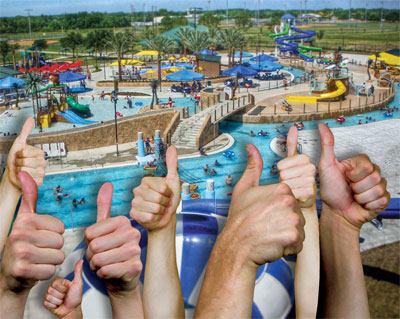If industry Zeitgeist is to be believed, the year 2012 is going to be a good one for aquatics.
Financing is still tight and no one is expecting an economic miracle, but based on their experiences at industry events in fall 2011, many designers and manufacturers anticipate more business this year.
Several industry professionals reported that international waterpark development is still strong, particularly in Asia.
“As long as I’m willing to travel, there’s business,” said Scott Cook, president of Family Fun Corp., based in Louisville, Ohio.
Here in the United States, it appears that more existing parks are looking to expand and upgrade.
“For the last few years it was ‘just keep me open,’” said Ryan Norris, waterpark sales manager at Denver-based PurePlay. “Now it’s ‘let me do a little something [to enhance my waterpark].’”
For most, that means refurbishing an existing attraction, or adding some bells and whistles, but there are some large expansion projects happening domestically. These include the multimillion-dollar renovation at Kalahari Resort, Wisconsin Dells, Wis.; an expansion at Soak City Kings Island in Mason, Ohio; and Aquatica Texas, set to open at SeaWorld San Antonio in May.
Kings Island will open a $10 million waterpark expansion this spring, and the Kalahari Resort renovation, which officially opened last month, includes a new slide complex featuring the first indoor SuperLOOP water slide in the nation.
Clearly, those projects are already under way, and the true indications for how 2012 will shape up will depend on deals closed in the first quarter, said Penny Peavler, brand development and marketing director at Weber Group in Sellersburg, Ind. “At this point, we’re really talking about 2013,” she noted, “since planning and construction take time.”
Two key factors likely to influence business in 2012 and beyond are technology and the Model Aquatic Health Code.
There are now more ways than ever to enhance existing rides, thanks to options such as programmable lighting and sound systems. And with social media and other online tools, operators have more opportunities than ever to get creative with their marketing and guest experience. The Model Aquatic Health Code, an initiative spearheaded by the Centers for Disease Control and Prevention, likely will see completion in 2012.
It is an effort to create a uniform code that states and local agencies can adopt in whole or in part, which could potentially mean new regulations in some areas.



